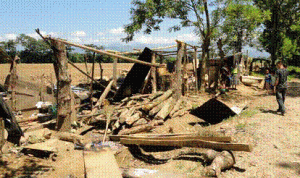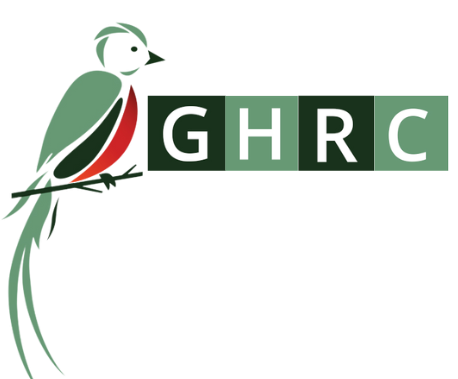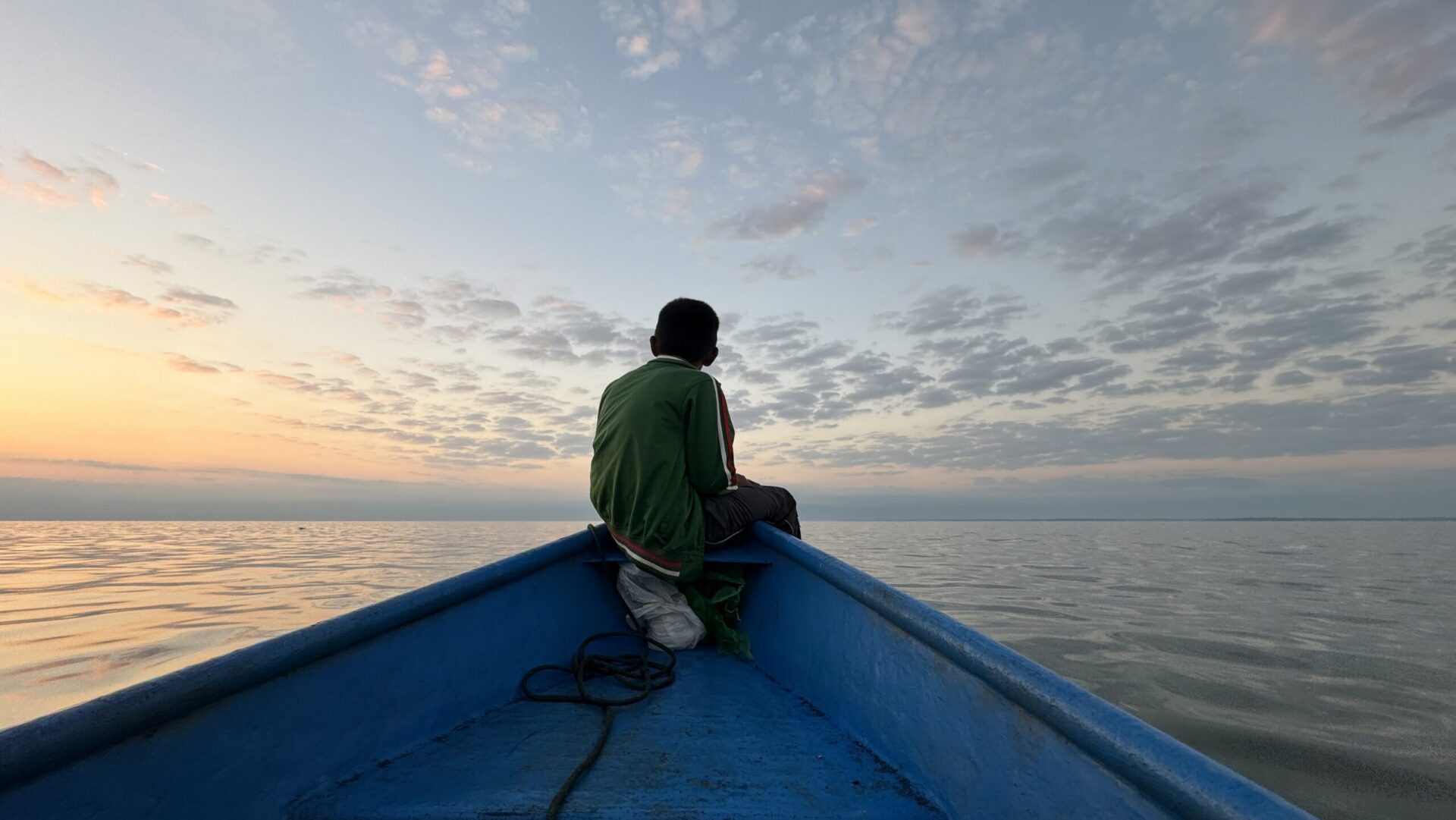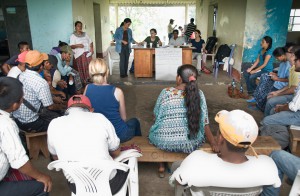 In a series of violent, forced evictions that took place starting March 15, 2011, almost 800 families from 12 communities were displaced in the Polochic Valley and left with nothing. Their eviction was demanded by the Widmann family, owners of the Chabil Utzaj sugar refinery, and recent financial backer Grupo Pellas from Nicaragua. A day earlier on March 14, Guatemalan government officials had met with a delegation of community leaders from the Polochic communities to discuss a solution to the urgent need for land.
In a series of violent, forced evictions that took place starting March 15, 2011, almost 800 families from 12 communities were displaced in the Polochic Valley and left with nothing. Their eviction was demanded by the Widmann family, owners of the Chabil Utzaj sugar refinery, and recent financial backer Grupo Pellas from Nicaragua. A day earlier on March 14, Guatemalan government officials had met with a delegation of community leaders from the Polochic communities to discuss a solution to the urgent need for land.
During the eviction, the families’ crops were completely destroyed to make way for sugar cane and African palm production, and they continue to live in dire poverty, many still without easy access to food or shelter. Three people have been assassinated since March and many more injured or threatened.
- On March 15, 2011, Miralvalle resident Antonio Beb Ac was killed by a head wound. Months later, a member of the National Civilian Police was arrested for his murder.
- On June 4, 2011, María Margarita Che Chub, a 37 year-old community leader from Parana, was shot and killed by heavily armed men who arrived by motorcycle at her home. She was murdered in the presence of her two young children.
Following the evictions, GHRC and a coalition of Guatemalan and international organizations petitioned the Inter-American Commission on Human Rights (IACHR) of the Organization of American States to approve precautionary measure for the communities. On June 20th, the IACHR granted precautionary measure for the 14 communities forcibly evicted in the Polochic.
Nonetheless, the government took no concrete action to ameliorate the families’ precarious situation.
- On August 10, 2011, 22 families were attacked at midnight by 30 paramilitary forces. The armed men, their faces covered, began firing their weapons and demanding that the community members leave the land belonging to Chabil Utzaj.
- On October 26, 2011, heavily armed members of private security of Chabil Utsaj sugar company burned down the shelters of the community of Paraná in the Polochic Valley. Soon after, another group of heavily armed men arrived at the community with their faces covered, claiming that they were narco traffickers, in order to further terrify the community. The community called a local judge for help, and were told that no police were available to help them.
As the communities continued to face security threats, they also were suffering another form of violence: hunger. The story of Wendy, one child with severe malnutrition, highlighted the tragic humanitarian consequences of the evictions. [Read an English translation of the article.]
In October 2011, GHRC brought two Guatemalan attorneys and two members of the evicted communities to Washington, DC to take part in a working meeting in the IACHR. The group also met with US Congressional Offices and the State Department.
On October 30, 2011, GHRC and partner organizations denounced the failure of the Guatemalan state to comply with the precautionary measures recommended by the IACHR and demanded that aid be delivered to the families and that the government resolve the land conflict. Read the press release: [English] [Español]
GHRC continued the pressure, including a petition with over 2000 signatures delivered to the Guatemalan Government. In December 2011, the government made the first delivery of food aid to the communities. There were a total of six deliveries made over the next seven months.
As a result of pressure from the families, as well as international groups, President Pérez Molina eventually promised that he would provide land to all of the displaced families during his first three years in office. However, only 140 families have since been relocated, and many of them live in poor conditions: no potable water, no roads, and little access to schools or health clinics. A preliminary report by the Red Cross has noted the critical health situation of the families, in particular the severe malnutrition suffered by women and children.
On December 2, 2014, dozens of community leaders from the Polochic Valley gathered outside the National Palace to remind the president of his promise to provide land for the other 629 families. The government announced that it would buy two more plots of land to distribute to 250 more families in March of 2015, and that the remaining families will receive land later in 2015. So far, these promises have not been met.
GHRC continues to support the affected families as a petitioner on their behalf in the Inter-American Commission on Human Rights, which, since 2011, has maintained precautionary measures aimed to ensure that families receive the basic services they need.
Communities affected by initial eviction
- Agua Caliente
- 1000 member strong police/military force arrived March 15, 2011, armed with small weapons
- The police violently invaded, using campesinos armed with machetes to destroy and burn the evicted families’ homes and crops.
- They also threw tear gas bombs.
- Wounded during the evictions were: Maria Elena Pau, Jose Tun and Rafel Suy
- The PNC detained Justo Tiul Chen and Sebastian Choc.
- Miralvalle
- 200 members of PNC and members of the army and Attorney General, accompanied by Director of Chabil Utzaj, Alan Felipe Diaz Widmann, Carlos Widmann Lagarde and Jorge Mario Barrientos entered the community and told the campesinos they had one hour to leave.
- Again, houses and crops were destroyed; guns were fired and tear gas bombs used.
- Antonio Beb Ac was killed.
- Wounded were: Tut Coy, Federico Caal, Emilio Xol Yat and Hugo Leonel Caal Caal.
- Quinich
- March 16, 2011, 600 police and military executed the eviction of 63 families. A squad was placed between Teleman and the Chabil Utzaj facilities to prevent solidarity with the community.
- Houses and crops were burned by workers contracted by the firm wearing military and police uniforms.
- Bella Flor
- On March 17, 2011, 200 PNC and military, along with security guards and individuals contracted by the company, evicted 36 families.
- Crops were destroyed.
- Members of the PDH were present.
- The PNC detained Manuel Xuc Cucul, 55 years old.
- Ocho de Agosto
- 11 families were evicted from national lands held by the Institute for Training and Agrarian Technology.
- Crops were destroyed.
- Approximately 50 campesinos were hired by the company to assist in the evictions. They were given PNC and military uniforms to carry out their duties.
- Rio Frio, Los Recuerdos, El Rodeo
- On March 17, 2011, 131 families were evicted from their homes in these communities.
- Human rights groups were not present, but the PDH and COPREDH were present.
- Carlos Widmann Lagarde participated in all the violent evictions of all three communities.
- El Sauce, Tinajas, Parana
- On March 18, 2011, the evictions continued by State forces.
- None of the communities resisted eviction, but nonetheless a force of 800 police and military were present.



